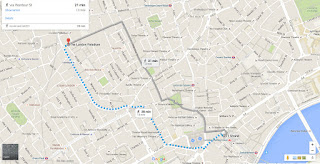Before discussing the full relevance of the above, a reminder that when the UK joined the European Economic Community (EEC) via European Communities Act 1972 and then held a Post-Legislative Referendum in 1975 on membership with the wording of the Referendum Question:
We come back to our concept of Can We Have Our Cake And Eat It Too? Using the historic evidence that hindsight of recording and reporting allows: We now know that the cake was much less a "Common Market" cake than a "Supranational Cake" with "Ever More Layers" or as per the Treaty of Rome:-"Do you think that the United Kingdom should stay in the European Community (The Common Market)?"
- RESOLVED to continue the process of creating an ever closer union among the peoples of Europe, in which decisions are taken as closely as possible to the citizen in accordance with the principle of subsidiarity,
- This Treaty marks a new stage in the process of creating an ever closer union among the peoples of Europe, in which decisions are taken as openly as possible and as closely as possible to the citizen
- DETERMINED to lay the foundations of an ever closer union among the peoples of Europe,
The wording of the above question therefore can be simply seen as very misleading in leading people to ask and answer a very different question and hence believe in a very different concept of "What is the EU?" This can be further demonstrated as pointed out via reviewing the reporting recorded at the time. Peter Hitchens provides a scan of the Campaign Documents in the 1975 Referendum here: The 1975 Common Market Referendum Campaign Documents
- The peoples of Europe, in creating an ever closer union among them,
Again the same forces in the News-Media of the time framed the debate using the inevitable "Heroes vs Villains" narrative tropes:
Again this "vilification characterization of arguments process" was described previously: I've been expecting you...
What can we learn from these examples? I would suggest:-
"How we structure our arguments and hence how we classify the quality of the arguments themselves determines both the outcome and the quality of answers to the posed questions."And indeed this is highly relevant to how we approach Democracy. We must think about how to argue before we then learn how to use the tools to argue before we then choose which arguments to make and with whom. The current form specifically concerns Referendums. It is probably a fair argument to make that the 1975 Referendum could be termed a "Top-Down" Referendum as opposed to a "Bottom-Up" Referendum from the people themselves. This categorization of the characteristics of a given referendum is well made: A Tale of Two Referendums: Elite Manipulation or Civic Engagement?
A useful summary beyond the technical details of regulation and running back towards the principles: EU politics: Germany in stasis :-
"The new movement, "Direct Democracy for Europe", Patzelt speaks about favourably. It certainly has "a chance", he says, a man who is demonstrably no great fan of representative democracy.
Those who want more democracy must resort to other means - referendums initiated by citizens, regardless of elections. The problem with representative democracy is that, after the vote, the citizen has no voice. "The most important instrument of political influence between elections", he says, "is the referendum".
However, not all referendums have the same value. If they are top down, they are a tool in the hands of professional politicians. The must work from the bottom up, with citizens deciding on the topics. He who fails to make this distinction will miss the opportunity of making a truly democratic system of government, Patzelt says."
Coming back to the idea of "learning how to argue" as per the movie reference above in "Wargames", then we can reshape how we think about the upcoming 2017 EU Referendum question:-
"Should the United Kingdom remain a member of the European Union or leave the European Union?"If we think of the question like the supercomputer in "Wargames" (WOPR) (War Operation Plan Response) only in terms of victory or defeat, Win or Lose, In or Out, Yes or No, Leave or Remain... then we are limiting ourselves to very narrow outcomes and hence a more limited future than is possible (in the film's case: Mutually Assured Destruction!).
What we have to do is "learn how to argue" in such a way that we ask more useful questions:
"How about a nice game of chess?"

















